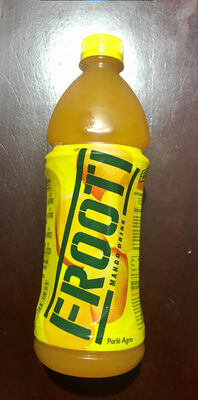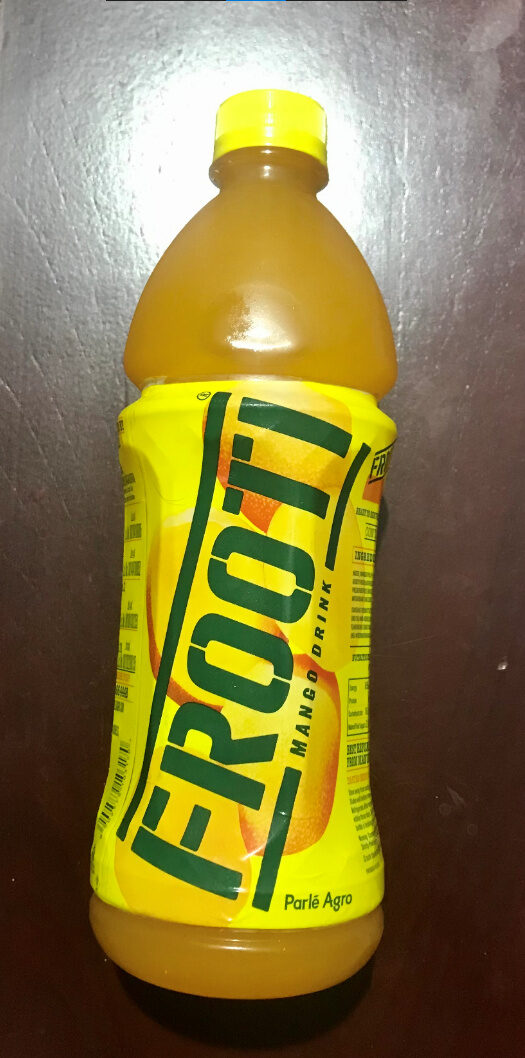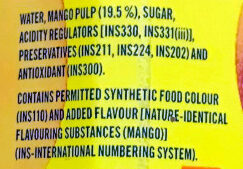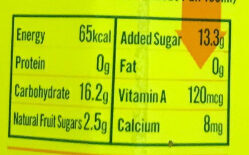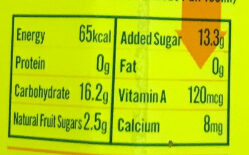Help us make food transparency the norm!
As a non-profit organization, we depend on your donations to continue informing consumers around the world about what they eat.
The food revolution starts with you!
FROOTI Mango Drink - Parle Agro - 600 ml
FROOTI Mango Drink - Parle Agro - 600 ml
Barcode: 8902579103170 (EAN / EAN-13)
Common name: Ready to serve mango drink
Quantity: 600 ml
Packaging: Bottle
Brands: Parle Agro, Frooti
Categories: Beverages and beverages preparations, Plant-based foods and beverages, Beverages, Plant-based beverages, Fruit-based beverages, Juices and nectars, Fruit nectars, Fruit juices, Mango nectars, Sweetened beverages
Labels, certifications, awards:
Vegetarian, Green Dot India
Origin of ingredients: India
Manufacturing or processing places: Sriperumbudur, Mysore, Medak, Patalganga
Link to the product page on the official site of the producer: http://thefrootilife.com/
Countries where sold: India
Matching with your preferences
Health
Ingredients
-
12 ingredients
Water, Mango Pulp (19.5%), Sugar, Acidity Regulators [INS330, INS331(iii)], Preservatives (INS211, INS224, INS202), Antioxidant (INS300)
Food processing
-
Processed foods
Elements that indicate the product is in the 3 - Processed foods group:
- Additive: E202 - Potassium sorbate
- Ingredient: Preservative
- Ingredient: Sugar
Food products are classified into 4 groups according to their degree of processing:
- Unprocessed or minimally processed foods
- Processed culinary ingredients
- Processed foods
- Ultra processed foods
The determination of the group is based on the category of the product and on the ingredients it contains.
Additives
-
E202 - Potassium sorbate
Potassium sorbate (E202) is a synthetic food preservative commonly used to extend the shelf life of various food products.
It works by inhibiting the growth of molds, yeast, and some bacteria, preventing spoilage. When added to foods, it helps maintain their freshness and quality.
Some studies have shown that when combined with nitrites, potassium sorbate have genotoxic activity in vitro. However, potassium sorbate is generally recognized as safe (GRAS) by regulatory authorities.
-
E211 - Sodium benzoate
Sodium benzoate: Sodium benzoate is a substance which has the chemical formula NaC7H5O2. It is a widely used food preservative, with an E number of E211. It is the sodium salt of benzoic acid and exists in this form when dissolved in water. It can be produced by reacting sodium hydroxide with benzoic acid.Source: Wikipedia
-
E224 - Potassium metabisulphite
Potassium metabisulfite: Potassium metabisulfite, K2S2O5, also known as potassium pyrosulfite, is a white crystalline powder with a pungent sulfur odour. The main use for the chemical is as an antioxidant or chemical sterilant. It is a disulfite and is chemically very similar to sodium metabisulfite, with which it is sometimes used interchangeably. Potassium metabisulfite is generally preferred out of the two as it does not contribute sodium to the diet. Potassium metabisulfite has a monoclinic crystal structure which decomposes at 190 °C, yielding potassium sulfite and sulfur dioxide: K2S2O5-s- → K2SO3-s- + SO2-g-Source: Wikipedia
-
E330 - Citric acid
Citric acid is a natural organic acid found in citrus fruits such as lemons, oranges, and limes.
It is widely used in the food industry as a flavor enhancer, acidulant, and preservative due to its tart and refreshing taste.
Citric acid is safe for consumption when used in moderation and is considered a generally recognized as safe (GRAS) food additive by regulatory agencies worldwide.
-
E331 - Sodium citrates
Sodium citrate: Sodium citrate may refer to any of the sodium salts of citrate -though most commonly the third-: Monosodium citrate Disodium citrate Trisodium citrateThe three forms of the salt are collectively known by the E number E331. Sodium citrates are used as acidity regulators in food and drinks, and also as emulsifiers for oils. They enable cheeses to melt without becoming greasy.Source: Wikipedia
-
E331iii - Trisodium citrate
Sodium citrate: Sodium citrate may refer to any of the sodium salts of citrate -though most commonly the third-: Monosodium citrate Disodium citrate Trisodium citrateThe three forms of the salt are collectively known by the E number E331. Sodium citrates are used as acidity regulators in food and drinks, and also as emulsifiers for oils. They enable cheeses to melt without becoming greasy.Source: Wikipedia
Ingredients analysis
-
Palm oil free
No ingredients containing palm oil detected
-
Vegan
No non-vegan ingredients
-
Vegetarian
No non-vegetarian ingredients detected
-
Details of the analysis of the ingredients
en: Water, Mango 19.5%, Sugar, Acidity Regulators (e330), e331iii, Preservatives (e211, e224, e202), Antioxidant (e300)- Water -> en:water - vegan: yes - vegetarian: yes - ciqual_food_code: 18066 - percent_min: 19.5 - percent_max: 80.5
- Mango -> en:mango - vegan: yes - vegetarian: yes - ciqual_food_code: 13025 - percent_min: 19.5 - percent: 19.5 - percent_max: 19.5
- Sugar -> en:sugar - vegan: yes - vegetarian: yes - ciqual_proxy_food_code: 31016 - percent_min: 0 - percent_max: 13.3
- Acidity Regulators -> en:acidity-regulator - percent_min: 0 - percent_max: 13.3
- e330 -> en:e330 - vegan: yes - vegetarian: yes - percent_min: 0 - percent_max: 13.3
- e331iii -> en:e331iii - vegan: yes - vegetarian: yes - percent_min: 0 - percent_max: 13.3
- Preservatives -> en:preservative - percent_min: 0 - percent_max: 13.3
- e211 -> en:e211 - vegan: yes - vegetarian: yes - percent_min: 0 - percent_max: 13.3
- e224 -> en:e224 - vegan: yes - vegetarian: yes - percent_min: 0 - percent_max: 6.65
- e202 -> en:e202 - vegan: yes - vegetarian: yes - percent_min: 0 - percent_max: 4.43333333333333
- Antioxidant -> en:antioxidant - percent_min: 0 - percent_max: 12.2
- e300 -> en:e300 - vegan: yes - vegetarian: yes - percent_min: 0 - percent_max: 12.2
Nutrition
-
Bad nutritional quality
⚠ ️Warning: the amount of fruits, vegetables and nuts is not specified on the label, it was estimated from the list of ingredients: 19This product is considered a beverage for the calculation of the Nutri-Score.
Positive points: 0
- Proteins: 0 / 5 (value: 0, rounded value: 0)
- Fiber: 0 / 5 (value: 0, rounded value: 0)
- Fruits, vegetables, nuts, and colza/walnut/olive oils: 0 / 10 (value: 19.5, rounded value: 19.5)
Negative points: 19
- Energy: 10 / 10 (value: 272, rounded value: 272)
- Sugars: 9 / 10 (value: 13.3, rounded value: 13.3)
- Saturated fat: 0 / 10 (value: 0, rounded value: 0)
- Sodium: 0 / 10 (value: 0, rounded value: 0)
The points for proteins are not counted because the negative points are greater or equal to 11.
Nutritional score: (19 - 0)
Nutri-Score:
-
Nutrient levels
-
Fat in low quantity (0%)
What you need to know- A high consumption of fat, especially saturated fats, can raise cholesterol, which increases the risk of heart diseases.
Recommendation: Limit the consumption of fat and saturated fat- Choose products with lower fat and saturated fat content.
-
Saturated fat in low quantity (0%)
What you need to know- A high consumption of fat, especially saturated fats, can raise cholesterol, which increases the risk of heart diseases.
Recommendation: Limit the consumption of fat and saturated fat- Choose products with lower fat and saturated fat content.
-
Sugars in high quantity (13.3%)
What you need to know- A high consumption of sugar can cause weight gain and tooth decay. It also augments the risk of type 2 diabetes and cardio-vascular diseases.
Recommendation: Limit the consumption of sugar and sugary drinks- Sugary drinks (such as sodas, fruit beverages, and fruit juices and nectars) should be limited as much as possible (no more than 1 glass a day).
- Choose products with lower sugar content and reduce the consumption of products with added sugars.
-
Salt in low quantity (0%)
What you need to know- A high consumption of salt (or sodium) can cause raised blood pressure, which can increase the risk of heart disease and stroke.
- Many people who have high blood pressure do not know it, as there are often no symptoms.
- Most people consume too much salt (on average 9 to 12 grams per day), around twice the recommended maximum level of intake.
Recommendation: Limit the consumption of salt and salted food- Reduce the quantity of salt used when cooking, and don't salt again at the table.
- Limit the consumption of salty snacks and choose products with lower salt content.
-
-
Nutrition facts
Nutrition facts As sold
for 100 g / 100 mlCompared to: Mango nectars Energy 272 kj
(65 kcal)+31% Fat 0 g -100% Saturated fat 0 g -100% Carbohydrates 16.2 g +36% Sugars 13.3 g +19% Added sugars 13.3 g Fiber 0 g -100% Proteins 0 g -100% Salt 0 g -100% Alcohol 0 % vol Vitamin A 120 µg -100% Calcium 8 mg -0% Fruits‚ vegetables‚ nuts and rapeseed‚ walnut and olive oils (estimate from ingredients list analysis) 19.5 %
Environment
-
Eco-Score B - Low environmental impact
⚠ ️Select a country in order to include the full impact of transportation.The Eco-Score is an experimental score that summarizes the environmental impacts of food products.→ The Eco-Score was initially developped for France and it is being extended to other European countries. The Eco-Score formula is subject to change as it is regularly improved to make it more precise and better suited to each country.Life cycle analysis
-
Average impact of products of the same category: A (Score: 84/100)
Category: Mango nectar
Category: Mango nectar
- PEF environmental score: 0.05 (the lower the score, the lower the impact)
- including impact on climate change: 0.59 kg CO2 eq/kg of product
Stage Impact Agriculture
39.3 %Processing
-17.7 %Packaging
28.2 %Transportation
42.2 %Distribution
8.0 %Consumption
0.0 %
Bonuses and maluses
-
Origins of ingredients with a high impact
Malus: -5
Environmental policy: -5
Transportation: 0
Origin of the product and/or its ingredients % of ingredients Impact India 100 %High
-
Packaging with a medium impact
Malus: -7
Shape Material Recycling Impact 1 Bottle cap HDPE 2 - High-density polyethylene Recycle with plastics Medium 1 Bottle PET 1 - Polyethylene terephthalate Recycle with plastics Medium 1 Label Plastic Recycle with plastics High
Eco-Score for this product
-
Impact for this product: B (Score: 72/100)
Product: FROOTI Mango Drink - Parle Agro - 600 ml
Life cycle analysis score: 84
Sum of bonuses and maluses: -12
Final score: 72/100
-
Carbon footprint
-
Equal to driving 0.3 km in a petrol car
59 g CO² per 100g of product
The carbon emission figure comes from ADEME's Agribalyse database, for the category: Mango nectar (Source: ADEME Agribalyse Database)
Stage Impact Agriculture
13.2 %Processing
33.7 %Packaging
11.3 %Transportation
39.3 %Distribution
2.4 %Consumption
0.0 %
Packaging
-
Packaging with a medium impact
-
Packaging parts
1 x Bottle cap (HDPE 2 - High-density polyethylene)
1 x Bottle 600ml (PET 1 - Polyethylene terephthalate)
1 x Label (Plastic)
-
Packaging materials
Material % Packaging weight Packaging weight per 100 g of product Plastic
-
Transportation
-
Origins of ingredients
Origins of ingredients with a high impact
Origin of the product and/or its ingredients % of ingredients Impact India 100 %High
Report a problem
-
Incomplete or incorrect information?
Category, labels, ingredients, allergens, nutritional information, photos etc.
If the information does not match the information on the packaging, please complete or correct it. Open Food Facts is a collaborative database, and every contribution is useful for all.
Data sources
Product added on by openfoodfacts-contributors
Last edit of product page on by foodless.
Product page also edited by aleene, chunkieramos, ecoscore-impact-estimator, itsumit, off.730eea72-0013-4926-8966-c908d683526e, packbot.
